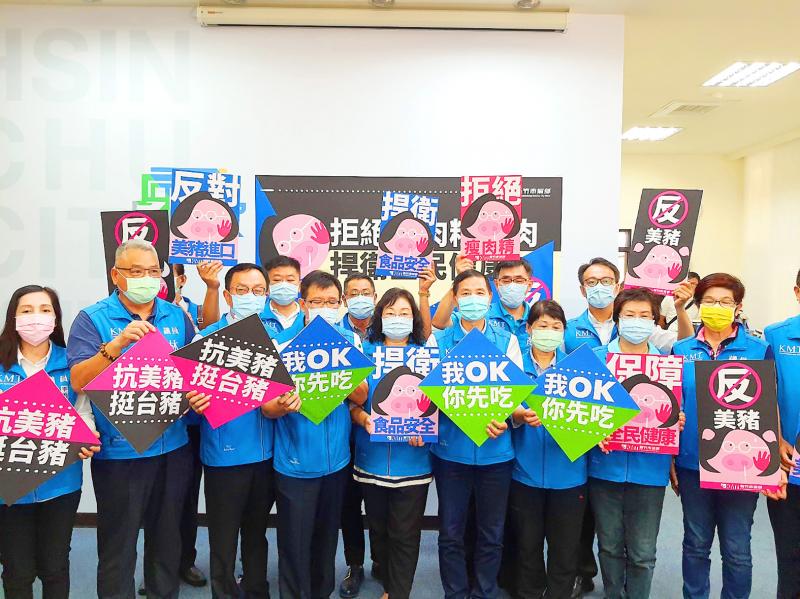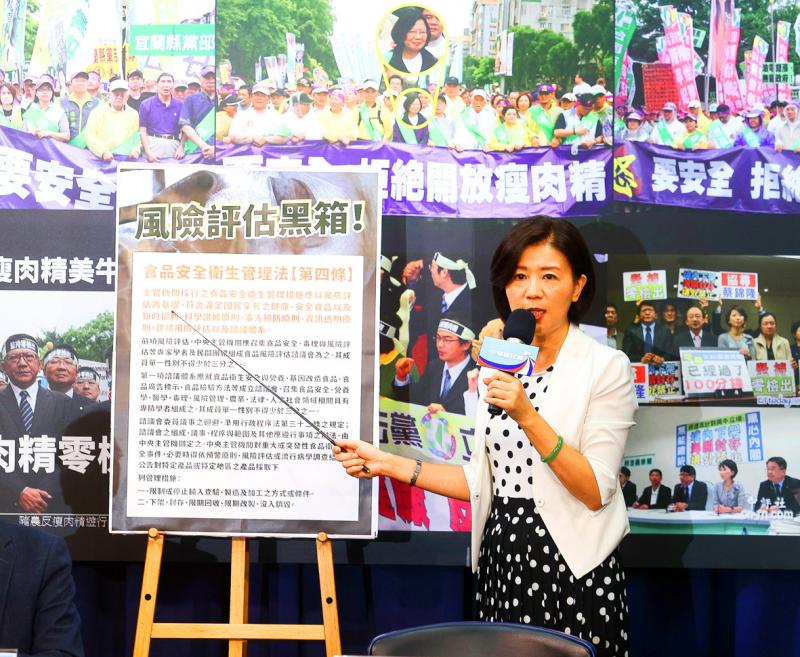The Chinese Nationalist Party (KMT) yesterday said it is planning to push for cities and counties nationwide to implement ordinances that would effectively ban pork containing ractopamine.
KMT Chairman Johnny Chiang (江啟臣), Taitung County Commissioner Yao Ching-ling (饒慶鈴), Taitung County Council Speaker Wu Hsiu-hua (吳秀華) and other members of the KMT Taitung County Council caucus held a news conference at the council to protest the Democratic Progressive Party (DPP) government’s decision to allow the import of US pork containing ractopamine.
“Is this the era of authoritarianism?” they asked.

Photo: Hung Mei-hsiu, Taipei Times
The KMT said that it would supervise the central government’s decision through its caucuses in county and city councils or set local ordinances to block it.
People’s health is more important than anything, Chiang said, accusing President Tsai Ing-wen’s (蔡英文) administration of not communicating with the public, refusing to be subject to supervision and making the decision rashly.
The Tsai administration announced that it would relax restrictions on US pork and beef without any regard for the local industry and people’s health, and without public consensus, he said.

Photo: CNA
Chiang also accused the DPP of having double standards, saying that it had previously opposed the use of ractopamine.
According to the Local Government Act (地方制度法), health management is a local government matter, and local governments have the authority to formulate such ordinances, he said.
Some cities and counties have already formulated ordinances banning ractopamine, he said, adding that KMT city and county caucuses would demand that local governments enforce those ordinances.
In cities and counties where such ordinances have not been put in place, the caucuses would work to ensure they are, the KMT said, adding that such ordinances are in place in some cities and counties, but could be improved upon.
At a separate news conference, New Taipei City Councilor and KMT spokeswoman Chiang I-chen (江怡臻) said that the KMT New Taipei City Council caucus would this week propose amendments to the city’s food safety ordinance to require “zero” traces of ractopamine in US pork.
KMT Culture and Communications Committee chairwoman Alicia Wang (王育敏) asked whether the Tsai administration had conducted a proper risk assessment regarding its decision to allow US pork containing ractopamine.
Wang said the decision was made in haste and failed to follow proper administrative procedure.
Former president Ma Ying-jeou’s (馬英九) administration had to make some compromises to bolster international trade, but it insisted on separate policies for pork and beef, because Taiwanese consume less beef, Wang said.
However, the Tsai administration made compromises on the import of pork and internal organs of the animals, she said, adding that the decision would have a great impact on the health of Taiwanese.
The Ma administration also faced pressure on the issue, Wang said, but added that the health of people should be the “bottom line.”
Separately yesterday in response to media queries, New Taipei City Mayor Hou You-yi (侯友宜) of the KMT asked if health risk evaluations regarding the import of US pork and beef have been completed, and whether there are supporting measures to safeguard people’s health.
Taipei Mayor Ko Wen-je (柯文哲) said the central government’s announcement was too abrupt, adding that it appeared “domineering” by setting the implementation date for Jan. 1 without discussing it with the public in advance.
He said that the DPP should explain why imported pork can contain ractopamine residue, but domestic pig farmers are prohibited from using the substance.
The party should also explain its control measures and whether internal organs of pigs would also be allowed to be imported.
Additional reporting by Lee I-chia

NUMBERS IMBALANCE: More than 4 million Taiwanese have visited China this year, while only about half a million Chinese have visited here Beijing has yet to respond to Taiwan’s requests for negotiation over matters related to the recovery of cross-strait tourism, the Tourism Administration said yesterday. Taiwan’s tourism authority issued the statement after Chinese-language daily the China Times reported yesterday that the government’s policy of banning group tours to China does not stop Taiwanese from visiting the country. As of October, more than 4.2 million had traveled to China this year, exceeding last year. Beijing estimated the number of Taiwanese tourists in China could reach 4.5 million this year. By contrast, only 500,000 Chinese tourists are expected in Taiwan, the report said. The report

SHIPS, TRAINS AND AUTOMOBILES: The ministry has announced changes to varied transportation industries taking effect soon, with a number of effects for passengers Beginning next month, the post office is canceling signature upon delivery and written inquiry services for international registered small packets in accordance with the new policy of the Universal Postal Union, the Ministry of Transportation and Communications said yesterday. The new policy does not apply to packets that are to be delivered to China, the ministry said. Senders of international registered small packets would receive a NT$10 rebate on postage if the packets are sent from Jan. 1 to March 31, it added. The ministry said that three other policies are also scheduled to take effect next month. International cruise ship operators

Temperatures are forecast to drop steadily as a continental cold air mass moves across Taiwan, with some areas also likely to see heavy rainfall, the Central Weather Administration (CWA) said. From today through early tomorrow, a cold air mass would keep temperatures low across central and northern Taiwan, and the eastern half of Taiwan proper, with isolated brief showers forecast along Keelung’s north coast, Taipei and New Taipei City’s mountainous areas and eastern Taiwan, it said. Lows of 11°C to 15°C are forecast in central and northern Taiwan, Yilan County, and the outlying Kinmen and Lienchiang (Matsu) counties, and 14°C to 17°C

STEERING FAILURE: The first boat of its class is experiencing teething issues as it readies for acceptance by the navy, according to a recent story about rudder failure The Hai Kun (海鯤), the nation’s first locally built submarine, allegedly suffered a total failure of stern hydraulic systems during the second round of sea acceptance trials on June 26, and sailors were forced to manually operate the X-rudder to turn the submarine and return to port, news Web site Mirror Daily reported yesterday. The report said that tugboats following the Hai Kun assisted the submarine in avoiding collisions with other ships due to the X-rudder malfunctioning. At the time of the report, the submarine had completed its trials and was scheduled to begin diving and surfacing tests in shallow areas. The X-rudder,